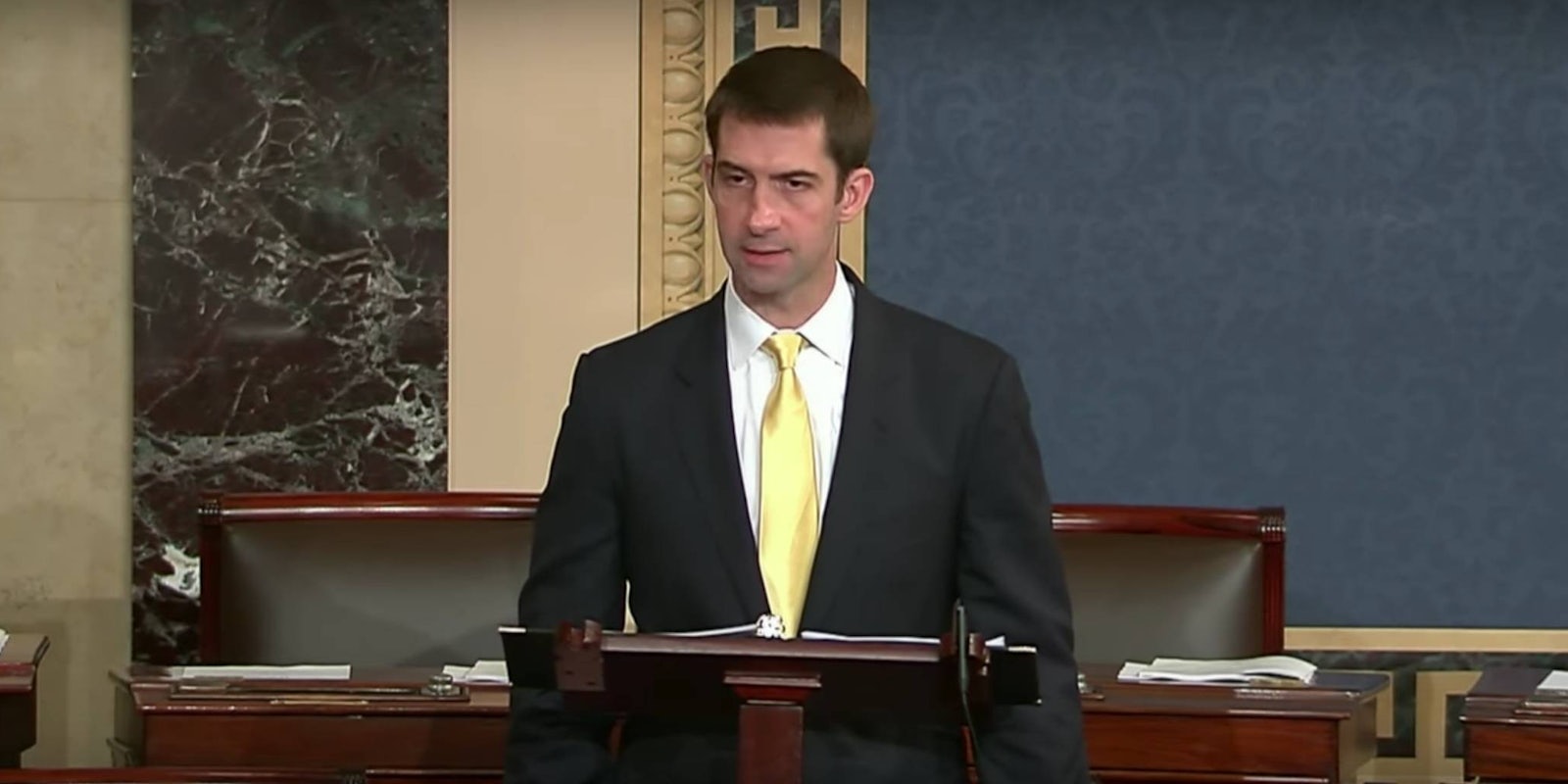On Sunday morning, Sen. Tom Cotton sat down for an interview with NBC News’ Chuck Todd on Meet The Press.
The brunt of Cotton’s appearance primarily concerned the controversial recent meeting between Attorney General Loretta Lynch and former president Bill Clinton as well as the ongoing investigation into Democratic presidential nominee Hillary Clinton’s private email server.
Though Cotton made the argument against Clinton in very forceful terms, he eventually ran into a patch of awkwardness that nearly every prominent Republican who goes on TV these days does: He was asked to make an affirmative case for presumptive GOP nominee Donald Trump, and he either wouldn’t or couldn’t bring himself to do it.
Starting things off, Todd asked Cotton about the U.S. military strategy against ISIS. Unsurprisingly, the Arkansas senator took the opportunity to lambast President Obama and his administration’s strategy. Specifically, he said that rather than making “a new policy change” in the aftermath of individual ISIS attacks (or, as the case may be, ISIS-inspired or credited attacks), the administration should unleash everything it might do in response right now.
“At a minimum, we should take stock of all the policies that we might pursue after a terror attack, and we should pursue all of them right now, before there’s another attack.”
This led into Cotton excoriating Clinton’s judgment and decision-making, criticizing her both for failing to secure a new deal to keep U.S. troops in Iraq in 2011, and for her leadership role in what he described as the “Libyan misadventure” ? if you sense a double-standard on this Iraq/Libya comparison, well, there ya go.
Shortly after, Todd managed to put Cotton in quite a bind, all by asking him what should be the simplest question for any elected Republican in a presidential campaign season: What’s your positive, affirmative case for your nominee?
Cotton is clearly nothing if not capable of trashing Clinton, but Todd challenged him to explain not just why he dislikes her, but how he’d “make the case for Donald Trump” instead, noting “you just made a whole speech by the way, earlier this weekend, you didn’t even mention his name.”
And, just like Mitch McConnell a week before him, Cotton wanted no part of this discussion. Here’s how he replied to a straightforward opportunity to talk up his party’s nominee:
Well Chuck, the case against Hillary Clinton’s judgment in foreign policy is very strong, to say nothing of her support for Obamacare, immigration, the fact that she’d appoint a fifth liberal justice to the Supreme Court.
Todd interrupted Cotton, again asking him “what’s the case for Donald Trump?” Then, at long last, the Arkansas senator uttered the magic words: “Donald Trump can ultimately make the case for himself.”
Cotton went on to explain ways in which he felt Trump’s ideas were closer to the American public than Clinton’s—on ISIS, on protecting America’s “core national interests,” and on what he called the “slapdash” Libyan intervention. Though, contrary to some of his repeated claims, Trump supported the Libyan intervention before it occurred.
“Donald Trump can ultimately make the case for himself.”
Cotton visibly didn’t want to talk about Trump, and was wary if not completely unwilling to advocate for any Trump policies beyond the vaguest, broadest possible terms. It’s a similar look to when ABC News’ George Stephanopoulos asked Senate majority leader Mitch McConnell to address whether Trump was truly “qualified” to be president, and McConnell repeatedly deflected with some variation of “I’ll leave that for the American people to decide.”
When it comes time to vigorously defend their party’s standard-bearer, a slew of prominent elected Republicans have been coming up empty, dodging Trump-related questions as if waltzing on eggshells. Whether this is a tenable position for the next several months in unclear, but at the very least, the man himself seems none too pleased about it.


